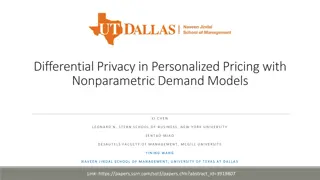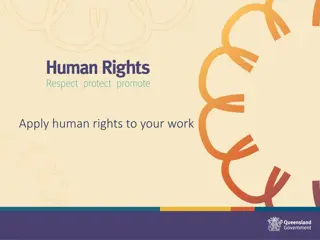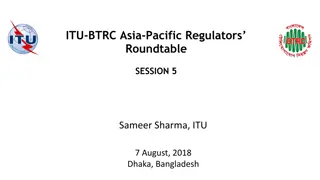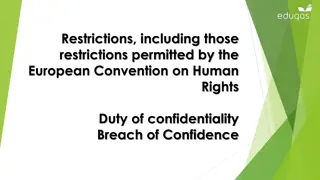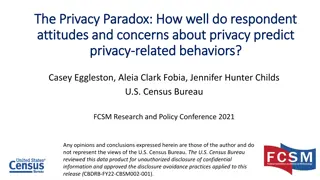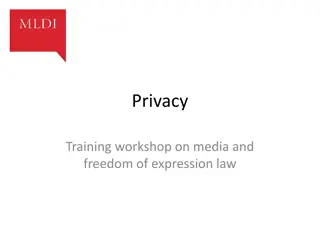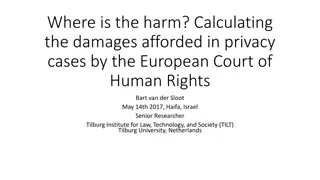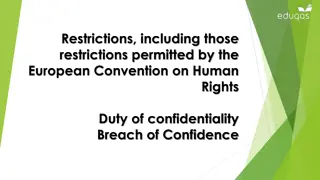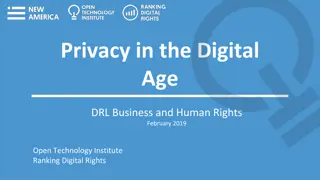Mastering Digital Rights for a Privacy-Focused Future
European privacy protection is deeply rooted in human rights treaties established post-World Wars. Explore the evolution of digital rights, from ECHR to modern data protection acts, shaping privacy laws globally.
Download Presentation

Please find below an Image/Link to download the presentation.
The content on the website is provided AS IS for your information and personal use only. It may not be sold, licensed, or shared on other websites without obtaining consent from the author.If you encounter any issues during the download, it is possible that the publisher has removed the file from their server.
You are allowed to download the files provided on this website for personal or commercial use, subject to the condition that they are used lawfully. All files are the property of their respective owners.
The content on the website is provided AS IS for your information and personal use only. It may not be sold, licensed, or shared on other websites without obtaining consent from the author.
E N D
Presentation Transcript
EURORDIS OPEN ACADEMY ALUMNI MASTERCLASS ON DIGITAL RIGHTS 8 SEPTEMBER 2023
Outline Outline I. Setting the scene: history of digital rights II. Exploring digital rights III. Learning how to exercise your digital rights IV. Getting a sneak peek at how new technological advancements in healthcare can challenge digital rights 2
Setting the scene: history of digital rights Setting the scene: history of digital rights European privacy protection is based upon human rights treaties, both on a European level as well global level such as, e.g. the UN Declaration on Human Rights. A lot of the human rights conventions came out as a result of the atrocities of World War I and World War II. The Council of Europe (1949) plays a huge role in human rights establishment continent. It established the European Court of Human Rights and the European Convention on Human Rights (1953). on the European 3
Setting the scene: history of digital rights Setting the scene: history of digital rights The European Convention on Human Rights - ECHR (1953) A binding treaty concerning privacy and data protecton (1981), the Convention was enlarged by a special protocol. The ECHR Article 12: No one should be subjected to arbitrary interference with his privacy, family, home or correspondence, nor to attacks upon his honor and reputation. Everyone has the right to the protection of the law against such interference or attacks. 4
Setting the scene: history of digital rights Setting the scene: history of digital rights In early 1960s, there was a discussion in Europe and in the USA about getting data from their inhabitants from different countries and computerise it. In the USA this resulted in the Privacy Act (1974), and the name which came from of Warren & Bandeis. In Europe it was being discussed on how to define the concept and what word to use. After a really lengthy discussion the outcome was Datenschutz , which from German was translated into data protection . So since then, in most European countries, we are not referring to privacy in a legal sense but we are referring to data protection. It resulted in adoption of a first Data Protection Act (1970) in Hessen, and followed by the application of the act in the entire Germany in 1977. 5
Setting the scene: history of digital rights Setting the scene: history of digital rights The right to privacy is, as a legal concept, a fairly recent invention. It dates back to a law review article published in December of 1890 by two young Boston lawyers, Samuel Warren and Louis Brandeis. Warren and Brandeis originally described the right to privacy as an already existing common law right which embodied protections for each individual s inviolate personality ? The common law secures to each individual the right of determining, ordinarily, to what extent his thoughts, sentiments, and emotions shall be communicated to others . . . fIx[ing] the limits of the publicity which shall be given them. 6 To its inventors, the right to privacy meant that each individual had the right to choose to share or not to share with others information about his or her private life, habits, acts, and relations. 6
Setting the scene: history of digital rights Setting the scene: history of digital rights In 1980, the The Organisation for Economic Co-operation and Development - OECD agreed upon eight principles of privacy. 1. Collection limitation principle. There should be limits to to the collection of personal data and any such data should be obtained by lawful and fair means. Where appropriate, with the knowledge or consent of the data subject. Data quality principle. Personal data should be relevant to the purposes for which they are used and to the context necessary for those purposes, they should be accurate, complete and kept up to date. 2. 3. Purpose specification principle. The purpose for which personal data collected should be specified not later than at the time of data collection. 4. Use limitation principle. Personal data should not be disclosed, made available, or otherwise used for purposes other than specified, except with the consent of the data subject or by the authority of law. 5. Security safeguard principle. Personal data should be protected by reasonable security, safeguards against such risk as a loss or unauthorised access, destruction use, modification or disclosure. 6. Openness principle. There should be a general policy of openness about developments, practices and policies with respect to personal data. 7. Individual participation principle. An individual should be able to obtain data from a data controller or get confirmation of the fact that his data is collected by this data controller. This individual participation principle is allowing the individual to get knowledge about the data that has been collected about him. 8. Accountability principle. That the data controller should be accountable for complying with measures which give effect to the principles as stated above. 7
Setting the scene: history of digital rights Setting the scene: history of digital rights EU s digital rights & principles, 2022: 1. Putting people and their rights at the centre of the digital transformation 2. Supporting solidarity and inclusion 3. Ensuring freedom of choice online 4. Fostering participation in the digital public space 5. Increasing safety, security and empowerment of individuals 6. Promoting the sustainability of the digital future 8
Q&A Q&A 9
EU regulatory environment EU regulatory environment EU Law: Treaty Regulation (General Data Protection Regulation, 2018) Directive (Data Protection Directive, 1995) Recommendations 10
Exploring digital rights: Your digital traces Exploring digital rights: Your digital traces You leave digital traces while surfing the internet, whatever device you use. Traces of which you are aware: your conscious traces (you said okay to the imposed conditions). But also many digital tracks you are not aware of: your unconscious tracks. These traces are collected via five major pushermen: Google, Amazon, Facebook, Apple and Microsoft. They use numerous data collectors for this. These data collectors add something to the data (e.g. patient association member) and resell it to anyone who wants to buy it. The enriched traces are used by algorithms to show you relevant advertisements including opinion advertisements and fun videos. You will be spied on . If a message addressed to you is the same every time, then you will skip it. A pusherman does not want that, so he ensures that every subsequent message is just a bit nicer, more clearly formulated and mores sensational and therefore appeals more to what you find relevant . In this way the pusherman contributes to your view shifting unnoticed and slowly. 11
Exploring digital rights: Personal data Exploring digital rights: Personal data Personal data is any information relating to you, whether it relates to your private, professional, or public life. In the online environment, where vast amounts of personal data are shared and transferred around the globe instantaneously, it is increasingly difficult for people to maintain control of their personal information. This is where data protection and laws such as the GDPR come in. 12
Exploring digital rights: Data protection Exploring digital rights: Data protection Data protection refers to the practices, safeguards, and binding rules put in place to protect your personal information and ensure that you remain in control of it. In short, you should be able to decide whether or not you want to share some information, who has access to it, for how long, and for what reason, and to be able to modify some of this information, and more. In the EU, these rules are defined under the General Data Protection Regulation. The GDPR is a user-centric law which aims to put you back in control of your personal data, providing for the broad spectrum of users rights. 13
Exploring digital rights: Data protection Exploring digital rights: Data protection Under the GDPR, both private companies such as Facebook, Microsoft, Dropbox, Amazon, or Spotify and government bodies have the obligation to ensure the protection of your personal data. To be protected under the GDPR, you have to either be a citizen of the European Union or be located in the EU, no matter where you are from. The GDPR comes with a robust enforcement mechanism which empowers data protection authorities to investigate data practices and fine companies or public entities up to 4% of their total worldwide annual turnover if they ignore their legal obligations and commit repeated, serious infringements of your rights. These fines are significant and proportionate to the gravity of the infringement on individuals fundamental rights. 14
Exploring digital rights: the right to Exploring digital rights: the right to information information When a company, a government body, or an organisation collects and uses information about you, you have the right to get information about: the name of the entity using your data, the contact information of the person or department in charge of personal data protection at this entity, the reason for which the entity will use your data, the type of personal data the entity holds about you, the length of time your data will be kept, whether your data will be shared with third parties and who they are, whether your data will be used for automated decision making via algorithms, whether data will be moved outside the EU, your other basic data protection rights, your right to file a complaint, and what legal basis has been used to authorise the collection and use of your personal data. There are several legal grounds authorising entities to use personal data under the GDPR, such as your explicit and informed consent or the execution of a contract. 15
Exploring digital rights: the right to Exploring digital rights: the right to information information All this information should be provided to you in a concise, transparent, intelligible way, using clear and plain language. This means that an entity must have terms of service and a privacy policy that are easily understood, which has not typically been the case. Relevant article under the GDPR: Articles 12, 13, and 14 16
Exploring digital rights: the right to access Exploring digital rights: the right to access No matter how your information was collected, you have the right to ask for and obtain information from a company, a government body, or an organisation as to whether it holds any personal data about you. If an entity has information about you, you then have the right to be provided, free of charge, a copy of your data and any relevant additional information regarding the reason your information was collected and used, how long it has been kept, whether it was disclosed to a third party, and more. Unless you ask otherwise, you will be provided a copy of your data electronically (e.g., via email or online forms) 17
Exploring digital rights: the right to access Exploring digital rights: the right to access You can exercise this right several times at reasonable intervals, but if your requests are repetitive, an entity may ask a fee from the second request. Keep in mind that this right is not absolute. If your request impacts the rights and freedoms of others, you may receive only a partial copy of this information, or none. However, the entity shall explain why it was not possible to provide you with the information. Relevant article under the GDPR: Article 15 18
Exploring digital rights: the right to Exploring digital rights: the right to rectification rectification You have the right to amend and modify the information that a company, government body, or organisation has about you if this information is incorrect, incomplete, or inaccurate (for instance, if you have changed your contact details or residence). Once you have notified the entity, it has the obligation to change your information within a month. During this period, the entity can refuse to modify the information but must then notify you and explain why. Relevant article under the GDPR: Article 16 19
Exploring digital rights: he right to restrict Exploring digital rights: he right to restrict processing processing Under certain circumstances, you have the right to request that a company, government body, or organisation stop using or limit the use of information about you so that you can verify the way that the entity is using it. As an example, you can exercise this right when: In addition, when you have consented to use of your personal data, you have the right to withdraw that consent at any time by notifying the entity. it is unclear whether and when personal data about you will be deleted, the accuracy of the data is contested the data is no longer needed for the purposes it was originally collected but it cannot be deleted because of legal obligations, and Relevant article under the GDPR: Article 18 you have exercised your right to object to the use of your data altogether, but the decision is pending 20
Exploring digital rights: the right to erasure Exploring digital rights: the right to erasure You have the right to ask for the deletion of your personal data when: a company, government body, or organisation holds information about you that is no longer needed (for instance, if you have chosen to leave a service or a platform), or your data has been used unlawfully. In addition, personal data that you provided before you were 16 years old can be deleted at any time at your request. The age requirement for children may vary in some EU states from 13 to 16 years old 21
Exploring digital rights: the right to erasure Exploring digital rights: the right to erasure Keep in mind that when you ask that your data be deleted, companies may retain information they have created based on your data. For instance, a company like Facebook that creates profiles or makes assumptions about you based on your likes or browsing habits may keep that information. It is recommended to request deletion of this information explicitly when you leave a platform, and if they fail to act, to bring a complaint. Relevant article under the GDPR: Article 17 22
BREAK BREAK 10 MIN 10 MIN 23
Exploring digital rights: the right to object Exploring digital rights: the right to object You have the right to object to the collection, use, and storage of your personal data by a company, government body, or organisation when: your data is being used for direct marketing (after your request, the entity must stop using your personal data and comply with your request free of charge.), your data is being used for automated decision making, including profiling, where no human intervention or review will take place, your data is being used for scientific or historical research and statistics, and your data is being used for an entity s legitimate interest or in carrying out a task in the public interest. In the last two scenarios, your right to object may be limited if the entity can demonstrate that the use of your data is necessary and that the reason for using it overrides your interests, rights, and freedoms. 24
Exploring digital rights: the right to object Exploring digital rights: the right to object Your right to object to use of your data for decision-making that is based solely on automated processes is perhaps one of the most important rights in the era of big data. Through techniques like profiling, your information is gathered to be evaluated, analysed, and used to predict your behaviour and make assumptions about you. This practice is fundamentally contrary to your right to privacy and can be highly discriminatory. Even if your right to object is limited under national laws, we encourage you to exercise this right and bring a complaint if necessary. Relevant article under the GDPR: Article 21 25
Exploring digital rights: the right to Exploring digital rights: the right to explanation explanation When your data is used to make a decision about you, with an automated process such as the use of algorithms, you have the right to be given an explanation about its functioning. While the GDPR does not spell out details about the information you should receive, we recommend that you at least request: the information that was entered into the automated system, the reason for the use of the automated system (for example to calculate a credit or insurance rate, or decide on hiring), the objective of the use of the automated system (for example to speed up processes, or to limit mathematical errors), whether a human intervention and review of the process and decision will take place (if not, you have the right to object to the use of such an automated system), and your ability to challenge the decision made through use of the automated system, and to ask for a review Relevant article under the GDPR: Recital 71, Articles 13 to 15 26
Exploring digital rights: the right to data Exploring digital rights: the right to data portability portability You have the right to move your data from one service to another, and as such, to receive a file with your information in a structured, commonly used, and machine-readable format. This means that if you wish to move to a new social media platform, for example, you can do so quickly and easily by taking your data from the old platform to the new one. When it is technically feasible, you can directly request that your personal data be transferred to another company whose services you would like to use. This right relates only to information that you have provided to companies. Any data that companies collect or create based on your data will not necessarily be provided in a portable file. 27
Exploring digital rights: the right to data Exploring digital rights: the right to data portability portability This right is a novelty under data protection law and can help foster innovation and competition in the digital era, since it allows users to more easily switch between platforms. However, in order for this right to deliver its promise and for users and innovators to truly benefit from it, it will be important to develop and implement interoperability standards between services. This means that platforms should use a similar format for entering data. Relevant article under the GDPR: Article 20 28
How to exercise your rights How to exercise your rights You can exercise all the rights mentioned above by sending an email to any company, government body, or organisation that holds data about you. Most entities have a dedicated email address that you can use to exercise your rights which can be found in the terms of service or privacy policies that are required to be available online. We know these policies are typically long (although this should improve under the GDPR). However, we encourage you to take a look and search for a contact address. If you cannot find contact information, that conflicts with your right to information and you can bring this matter to a data protection authority (the list of DPAs is provided later in the slides). 29
What to do if your rights were misused? What to do if your rights were misused? You can file a complaint with the data protection authority (DPA) of the EU country where you are located. DPAs are independent public authorities that monitor, supervise, and enforce the application of the GDPR. They are here for you. The DPA has the obligation to inform you about the progress of any complaint three months after you file it. If at any point you are dissatisfied with the response from the DPA handling your complaint, you can bring the authority to court. You can file a case in court against a company, a government body, or an organisation.You can do this instead of, or in addition to, filing a complaint with your data protection authority. You have the right for a non-governmental organisation (NGO) to file a complaint on your behalf if the NGO is legally established, its activities are protecting individuals or the public interest, and the NGO has expertise in the area of data protection. This avenue is important to empower you if your complaint or case is lengthy and complex. Having the option of NGO representation opens more avenues for remedy, increasing the chances that violation of your rights will not go unpunished. 30
Austria Austria sterreichische Datenschutzbeh rde Hohenstaufengasse 3 1010 Wien Tel. +43 1 531 15 202525 dsb@dsb.gv.at https://www.dsb.gv.at/
Belgium Belgium Commission de la protection de la vie priv e Rue de la Presse 35 1000 Bruxelles Tel. +32 2 274 48 00 commission@privacycommission.be commission@privacycommission.be https://www.privacycommission.be/
Bulgaria Bulgaria Commission for Personal Data Protection 2, Prof. Tsvetan Lazarov blvd. Sofia 1592 Tel. +359 2 915 3523 kzld@cpdp.bg https://www.cpdp.bg/
Croatia Croatia Croatian Personal Data Protection Agency, Marti eva 14 10000 Zagreb Tel. +385 1 4609 000 azop@azop.hr http://www.azop.hr/
Cyprus Cyprus Cyprus Commissioner for Personal Data Protection, 1 Lasonos Street 1082 Nicosia P.O. Box 23378, CY-1682 Nicosia Tel. +357 22 818 456 commissioner@dataprotection.gov.cy http://www.dataprotection.gov.cy/
Czech Republic Czech Republic The Office for Personal Data Protection , Pplk. Sochora 27 170 00 Prague 7 Tel. +420 234 665 111 posta@uoou.cz https://www.uoou.cz/
Denmark Denmark Datatilsynet Borgergade 28, 5 1300 Copenhagen K Tel. +45 33 1932 00 dt@datatilsynet.dk https://www.datatilsynet.dk
Estonia Estonia Estonian Data Protection Inspectorate, V ike-Ameerika 19 10129 Tallinn Tel. +372 6274 135 info@aki.ee http://www.aki.ee/en
Finland Finland Office of the Data Protection Ombudsman P.O. Box 315 FIN-00181 Helsinki Tel. +358 10 3666 700 tietosuoja@om.fi https://tietosuoja.fi/en/home
France France Commission Nationale de l Informatique et des Libert s - CNIL 8 rue Vivienne, CS 30223 F-75002 Paris, Cedex 02 Tel. +33 1 53 73 22 22 https://www.cnil.fr/fr/plaintes https://www.cnil.fr/
Germany Germany Die Bundesbeauftragte f r den Datenschutz und die Informationsfreiheit Husarenstra e 30 53117 Bonn Tel. +49 228 997799 0 poststelle@bfdi.bund.de https://www.bfdi.bund.de/
Greece Greece Greece Hellenic Data Protection AuthorityKifisias Av. 1-3, PC 11523 Ampelokipi Athens Tel. +30 210 6475 600 contact@dpa.gr http://www.dpa.gr/
Hungary Hungary Data Protection Commissioner of Hungary, Szil gyi Erzs bet fasor 22/C H-1125 Budapest Tel. +36 1 3911 400 peterfalvi.attila@naih.hu http://www.naih.hu/
Ireland Ireland Ireland Data Protection Commissioner Canal House, Station Road Portarlington Co. Laois Tel. +353 57 868 4800 info@dataprotection.ie https://www.dataprotection.ie/
Italy Italy Garante per la protezione dei dati personali, Piazza di Monte Citorio, 121 00186 Roma Tel. +39 06 69677 1 garante@garanteprivacy.it https://www.garanteprivacy.it/
Latvia Latvia Data State Inspectorate Director, Blaumana str. 11/13-15 1011 Riga Tel. +371 6722 3131 info@dvi.gov.lv http://www.dvi.gov.lv/
Lithuania Lithuania Lithuania State Data Protection, ygimant str. 11-6a 011042 Vilnius Tel. +370 5 279 14 45 ada@ada.lt https://www.ada.lt/
Luxembourg Luxembourg Commission Nationale pour la Protection des Donn es, 1 avenue du Rock n Roll L-4361 Esch-sur-Alzette Tel. +352 2610 60 1 info@cnpd.lu https://cnpd.public.lu/
Malta Malta Malta Office of the Data Protection Commissioner, 2, Airways House High Street, Sliema SLM 1549 Tel. +356 2328 7100 commissioner.dataprotection@gov.mt commissioner.dataprotection@gov.mt http://www.dataprotection.gov.mt/
The Netherlands The Netherlands The Netherlands Autoriteit Persoons Gegevens, Prins Clauslaan 60 P.O. Box 93374 2509 AJ Den Haag/The Hague Tel. +31 70 888 8500 info@autoriteitpersoonsgegevens.nl https://autoriteitpersoonsgegevens.nl/nl


